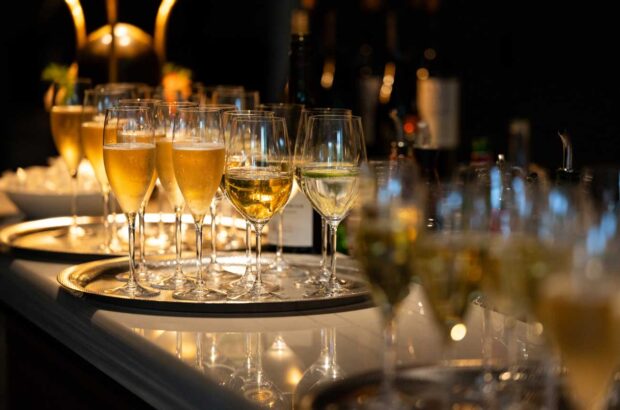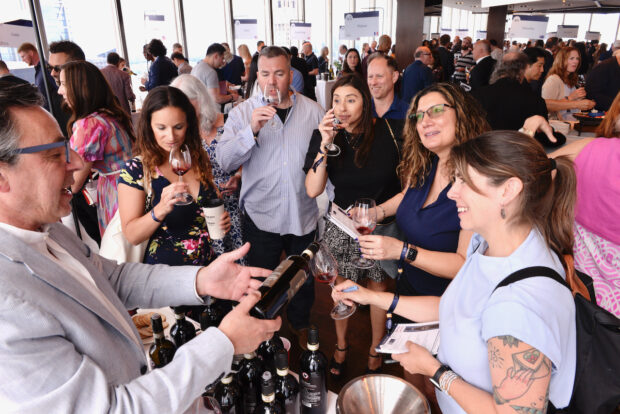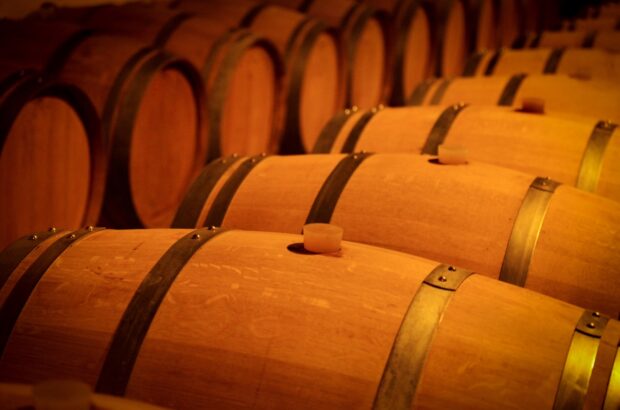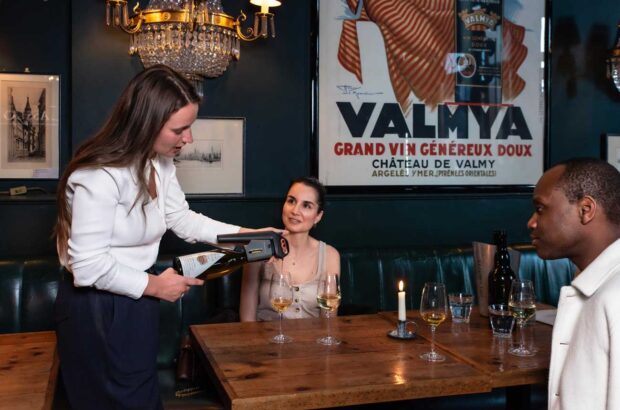Burgundy’s fragmented nature means négociants are the region’s glue –
and sources of great value. Stephen Brook introduces the major players
Anégociant in Bordeaux is a merchant who finds markets for wines bought from local
producers. A Burgundian négociant is very different. His role is to assemble wines from a variety of sources and then sell them to private customers, importers, restaurants and retailers. Individual growers may make excellent wines but because their holdings can often be divided among small plots in many vineyards, they often don’t have the volumes to supply clients in need of larger quantities. The négociant will buy either grapes (and vinify them) or must (and ferment it) or finished wines (and age them in their cellars). A network of brokers gives négociants access to these raw materials, or they may have contracts with growers who supply them regularly. They can then blend the resulting wines, offering a more substantial quantity of wine than an individual grower.
But Burgundy’s négociants are more than just blenders and merchants. Many are substantial property owners, offering both limited-volume wines from their own domaines, as well as blended wines. Grapes bought from outstanding growers often result in wines as good as those made from the négociants’ own vineyards, since many top estates regularly sell off barrels to maintain cash flow.
Nor is the distinction between a grower and a négociant that clear. Many domaines, unable to expand because of the high cost of land, will act as smallscale négociants to up production. There appears to be no legal requirement to differentiate wines made from purchased grapes from domaine-bottled wines, though in practice many growers do make that distinction. Thus Domaine Dujac offers its négociant wines under the Dujac Père et Fils label, and Domaine Robert Arnoux uses the Pascal Lachaud label for its excellent négociant range.
Some négociants still make wines of nocharacter and identity, but their number is dwindling. For the most part, négociant wines offer a welcome route into a region which can otherwise appear unwelcoming both in terms of its complexities and prices. Here are some of the best:
The big names
Founded in 1731, Bouchard Père et Fils (Fel) is one of the oldest firms, but it stumbled in the early 1990s, and the Bouchard family put it on the market. Champagne magnate Joseph Henriot bought it and acted swiftly, declassifying or throwing out any bottlings not up to
{"content":"PHA+c3RhbmRhcmQuIEhlIGFsc28gZXhwYW5kZWQgdGhlIGZpcm3igJlzIG93biBob2xkaW5ncyB0byBhIDEzMGhhIChoZWN0YXJlcykgaW4gdGhlIEPDtHRlIGTigJlPciwgb2Ygd2hpY2ggNzRoYSBhcmUgcHJlbWllcnMgY3J1cyBhbmQgMTJoYSBhcmUgZ3JhbmRzIGNydXMsIGluY2x1ZGluZyBvbmUgdGhpcmQgb2YgQ2hldmFsaWVyLU1vbnRyYWNoZXQuIEEgbmV3IHdpbmVyeSB3YXMgYnVpbHQgaW4gMjAwNSwgcGVybWl0dGluZyB0aGUgdmluaWZpY2F0aW9uIG9mIGh1bmRyZWRzIG9mIGRpZmZlcmVudCB3aW5lcy4gUXVhbGl0eSBpcyBub3cgZXhjZWxsZW50IGFjcm9zcyB0aGUgYm9hcmQsIHdpdGggd2hpdGUgZ3JhbmRzIGNydXMgb2Ygc3VwZXJiPC9wPgo8cD5xdWFsaXR5LCBhbmQgc2xlZWsgYW5kIHN1YnRsZSByZWRzIGZyb20gdGhlIEPDtHRlIGRlIEJlYXVuZS4gT25lIGhvdXNlIHNwZWNpYWxpdHkgaXMgQmVhdW5lIGR1IENow6J0ZWF1LCBhIGJsZW5kIGNyZWF0ZWQgaW4gMTkwNyB0byBtb3AgdXAgbnVtZXJvdXMgc21hbGwgcGFyY2VscyBvZiBCZWF1bmUgUHJlbWllciBDcnUsIHdoaXRlIGFuZCByZWQuPC9wPgo8ZGl2IGNsYXNzPSJhZC1jb250YWluZXIgYWQtY29udGFpbmVyLS1tb2JpbGUiPjxkaXYgaWQ9InBvc3QtaW5saW5lLTQiIGNsYXNzPSJpcGMtYWR2ZXJ0Ij48L2Rpdj48L2Rpdj4KPHA+TWFpc29uIENoYW1weSAoSEhDKSwgZm91bmRlZCBpbiAxNzIwLCBoYXMgZW5qb3llZCBhIG5ldyBsZWFzZSBvZiBsaWZlIHNpbmNlIDE5OTAgd2hlbiBpdCB3YXMgYWNxdWlyZWQgYnkgd2luZSBicm9rZXIgSGVucmkgTWV1cmdleSBhbmQgaGlzIHNvbiBQaWVycmUsIHdobyBub3cgcnVucyB0aGUgYnVzaW5lc3MuIFRoZSBNZXVyZ2V5cyBoYXZlIGJvdWdodCAxN2hhIG9mIHZpbmV5YXJkcywgbW9zdGx5IGluIHRoZSBDw7R0ZSBkZSBCZWF1bmUsIGJ1dCBzdGlsbCBidXkgaW4gZ3JhcGVzIGFuZCB3aW5lcy4gU2luY2UgMjAwNSwgdGhlIENoYW1weSB2aW5leWFyZHMgaGF2ZSBiZWVuIGZhcm1lZCBvcmdhbmljYWxseSwgd2l0aCBtYW55IHBhcmNlbHMgbm93IGNvbnZlcnRlZCB0byBiaW9keW5hbWlzbS4gVGhlIGJlc3QgQ2hhbXB5IHdpbmUgaXMgcHJvYmFibHkgdGhlIENvcnRvbi1DaGFybGVtYWduZSwgYW5kIGl0cyBiZXN0IHJlZCBpcyBvZnRlbiBNYXppcy1DaGFtYmVydGluLiBRdWFsaXR5IHdhcyBwYXRjaHkgaW4gdGhlIDE5OTBzIGJ1dCBoYXMgYmVlbiBtb3JlIGNvbnNpc3RlbnQgaW4gdGhlIHBhc3QgZml2ZSB5ZWFycy48L3A+CjxwPlRoZSBncmVhdCBWb2x0YWlyZSB3YXMgYSBjdXN0b21lciBvZiBDaGFuc29uIChNZW4pLCBhIHZlbmVyYWJsZSBmaXJtIHJ1biBmb3IgZ2VuZXJhdGlvbnMgYnkgdGhlIE1hcmlvbiBmYW1pbHkuIEJ5IHRoZSAxOTgwcywgaG93ZXZlciwgdGhlIHdpbmVzIHdlcmUgYmxhbmQsIGFuZCBkdWJpb3VzIHByYWN0aWNlcyBpbiB0aGUgY2VsbGFyIG9ubHkgY2FtZSB0byBsaWdodCBhZnRlciB0aGUgY29tcGFueSB3YXMgYm91Z2h0IGJ5IHRoZSBDaGFtcGFnbmUgaG91c2UgQm9sbGluZ2VyIGluIDE5OTkuIENoYW5zb24gaGFkIHNlZW4gbGl0dGxlIGludmVzdG1lbnQgZm9yIDUwIHllYXJzIGFuZCBCb2xsaW5nZXIgbW92ZWQgcXVpY2tseSB0byByZXN0b3JlIHRoZSB2aW5leWFyZHMgYW5kIHJlbm92YXRlIHRoZSBjZWxsYXJzLiBIZXJiaWNpZGVzIHdlcmUgbm8gbG9uZ2VyIHVzZWQgYW5kIG1lY2hhbmljYWwgaGFydmVzdGluZyBjZWFzZWQuIENoYW5zb27igJlzIHRydW1wIGNhcmRzIGFyZSB0aGUgbnVtZXJvdXMgQmVhdW5lIHByZW1pZXJzIGNydXMgdGhhdCBpdCBvd25zLCBvZiB3aGljaCB0aGUgYmVzdCBrbm93biBhcmUgQ2xvcyBkZXMgRsOodmVzIGFuZCBDbG9zIGRlcyBNb3VjaGVzICh3aGl0ZSBhbmQgcmVkKS4gQW1vbmcgaXRzIHRvcCB3aGl0ZSB3aW5lcyBpcyB0aGUgcm9idXN0IENvcnRvbiBWZXJnZW5uZXMuIFRoZSByZWRzIGNhbiBiZSBhIHRvdWNoIGV4dHJhY3RlZCwgYnV0IG92ZXJhbGwgdGhlIHdpbmVzIGhhdmUgZmFyIG1vcmUgcGVyc29uYWxpdHkgdGhhbiBwcmV2aW91c2x5LjwvcD4KPGRpdiBjbGFzcz0iYWQtY29udGFpbmVyIGFkLWNvbnRhaW5lci0tbW9iaWxlIj48ZGl2IGlkPSJwb3N0LWlubGluZS01IiBjbGFzcz0iaXBjLWFkdmVydCI+PC9kaXY+PC9kaXY+CjxwPlJvYmVydCBEcm91aGluLCB3aG8gaGFzIGJlZW4gaGFuZGluZyBvdmVyIHRoZSBmYW1pbHkgYnVzaW5lc3Mgb2YgSm9zZXBoIERyb3VoaW4gKFBvbCkgdG8gaGlzIGNoaWxkcmVuLCBpcyB0aGUgZXBpdG9tZSBvZiByZWZpbmVtZW50IGFuZCBzb2JyaWV0eTsgaGlzIHdpbmVzIHRlbmQgdG8gaGF2ZSB0aGUgc2FtZSBjaGFyYWN0ZXIuIFRoZSBEcm91aGlucyBhcmUgbm90IGludGVyZXN0ZWQgaW4gd2luZXMgb2YgZGVlcCBjb2xvdXIsIHJ1Z2dlZCB0YW5uaW5zIGFuZCBjb25jZW50cmF0aW9uLCBzbyB0aG9zZSB1bmZhbWlsaWFyIHdpdGggdGhlaXIgYWdlaW5nIHBvdGVudGlhbCBvZnRlbiBkaXNtaXNzIHRoZW0gYXMgbGlnaHR3ZWlnaHRzLiBOb3RoaW5nIGNvdWxkIGJlIGZ1cnRoZXIgZnJvbSB0aGUgdHJ1dGguIFRoZSBtb3N0IGltcG9ydGFudCBmYW1pbHkgaG9sZGluZ3MgYXJlIDMxaGEgb2YgcHJlbWllcnMgYW5kIGdyYW5kcyBjcnVzIGluIHRoZSBDw7R0ZSBk4oCZT3IsIGFuZCB0aGV5IGFsc28gb3duIDI4aGEgb2YgZ29vZCBzaXRlcyBpbiBDaGFibGlzLiBQaGlsaXBwZSBEcm91aGluIGhhcyBsb29rZWQgYWZ0ZXIgdGhlIHZpbmV5YXJkcyBmb3IgeWVhcnMsIG9wdGluZyBmb3IgaGlnaCBkZW5zaXR5PC9wPgo8cD5wbGFudGluZ3MgaW4gc29tZSBzaXRlcywgcmVwbGFjaW5nIG9sZCB2aW5lcyB3aXRoIG1hc3NhbCBzZWxlY3Rpb25zIHJhdGhlciB0aGFuIGNsb25lcywgYW5kLCBzaW5jZSAyMDA3LCBmYXJtaW5nIGJpb2R5bmFtaWNhbGx5LiBUaGUgRHJvdWhpbnMgYXJlIG5vdCBrZWVuIG9uIGV4Y2Vzc2l2ZSBuZXcgb2FrLCB3aGljaCByYXJlbHkgZXhjZWVkcyAyNSUuIEFtb25nIHRoZWlyIGJlc3Qga25vd24gd2luZXMgYXJlIHRoZSBDaGFzc2FnbmUtTW9udHJhY2hldCBhbmQ8L3A+CjxwPk1vbnRyYWNoZXQgbWFkZSBmcm9tIHBhcmNlbHMgb3duZWQgYnkgdGhlIE1hcnF1aXMgZGUgTGFndWljaGUsIGFuIGFycmFuZ2VtZW50IGluaXRpYXRlZCBpbiAxOTQ3LiBBbHNvIG5vdGV3b3J0aHkgYXJlIHRoZSB3aGl0ZXMgYW5kIHJlZHMgZnJvbSBCZWF1bmUgQ2xvcyBkZXMgTW91Y2hlcywgd2luZXMgZnJvbSB0b3Agc2l0ZXMgaW4gQ2hhbWJvbGxlIHN1Y2ggYXMgQW1vdXJldXNlcyBhbmQgTGUgTXVzaWdueSwgR3Jpb3R0ZS1DaGFtYmVydGluLCBhbmQgYSBob3N0IG9mIHRvcCBzaXRlcyBpbiBWb3NuZS1Sb21hbsOpZS4gT2Z0ZW4gbXJlc3RyYWluZWQgaW4geW91dGgsIHRoZXNlIGNhbiBkZXZlbG9wPC9wPgo8cD5pbnRvIHdpbmVzIG9mIGdyZWF0IHBvaXNlIGFuZCBiZWF1dHkuPC9wPgo8cD5UaGUgVVMtb3duZWQgZmlybSBvZiBKYWRvdCAoSGFNKSBtYWtlcyBmb3J0aHJpZ2h0LCBmdWxsLWZsYXZvdXJlZCwgd2VsbHN0cnVjdHVyZWQsIG9ha3kgd2luZXMsIGJlbmVmaXRpbmcgZnJvbSB0aGUgd2luZW1ha2luZyBicmlsbGlhbmNlIG9mIEphY3F1ZXMgTGFyZGnDqHJlIGZvciBhbG1vc3QgNDAgeWVhcnMuIFdpdGggNzhoYSB1bmRlciBpdHMgb3duZXJzaGlwIG9yIGNvbnRyb2wgKG5vdCB0byBtZW50aW9uIDcwaGEgaW4gQmVhdWpvbGFpcyksIHRoZSBjb21wYW55PC9wPgo8cD5tYWtlcyBhIGh1Z2UgbnVtYmVyIG9mIHdpbmVzIOKAkyBubyBmZXdlciB0aGFuIGZpdmUgcHJlbWllcnMgY3J1cyBmcm9tIEJlYXVuZSBhbmQgc2V2ZW4gZnJvbSBHZXZyZXktIENoYW1iZXJ0aW4g4oCTIGJ1dCB0aGVyZSBhcmUgZmV3IGRpc2FwcG9pbnRtZW50cy4gSW5mb3JtYWwgYWdyZWVtZW50cyB3aXRoIGdyb3dlcnMgYWxsb3cgSmFkb3QgdG8gaW5mbHVlbmNlIHRoZSBmYXJtaW5nLCBhbmQgaXQgd2lsbCBzb21ldGltZXMgc2VuZCBpbiBpdHMgb3duIGhhcnZlc3RlcnMuIFRoaXMgaGVscHMgTGFyZGnDqHJlIGFuZCBoaXMgdGVhbSB0byBtYWludGFpbiB0aGUgaGlnaGVzdCBzdGFuZGFyZHMuIFNvbWUgb2YgSmFkb3TigJlzIG93biB2aW5leWFyZHMgYXJlIGZhcm1lZCBiaW9keW5hbWljYWxseS4gV2hpdGVzIGFuZCByZWRzIGFyZSBlcXVhbGx5IGZpbmUuIEJlYXVuZSBDbG9zIGRlcyBVcnN1bGVzIGlzIGEgc2lnbmF0dXJlIHJlZCwgYnV0IHRoZXJlIGlzIGEgdmFzdCByYW5nZSB0byBjaG9vc2UgZnJvbSwgYW5kIGFsdGhvdWdoIHRoZSB3aW5lcyBhcmUgb24gdGhlIGV4cGVuc2l2ZSBzaWRlLCB0aGVyZSBhcmUgc3BsZW5kaWQgYm90dGxlcyBhbW9uZyBsZXNzZXIgYXBwZWxsYXRpb25zIHN1Y2ggYXMgdGhlIFNhbnRlbmF5IENsb3MgZGUgTWFsdGUgYW5kIFNhdmlnbnkgQ2xvcyBkZXMgR3VldHRlcy4gVGhlIHdoaXRlcyBzaG93IHRyZW1lbmRvdXMgZmxhaXIsIGVzcGVjaWFsbHkgdGhlIENoZXZhbGllci0gTW9udHJhY2hldCB3aGljaCwgd2hlbiB5b3VuZywgb2Z0ZW4gb3V0c2hpbmVzIHRoZSBtYWdpc3RlcmlhbCBNb250cmFjaGV0LiBMYXJkacOocmUgYWxzbyBwbGF5cyBjbG9zZSBhdHRlbnRpb24gdG8gdGhlIGNoZWFwZXIgZW5kIG9mIHRoZSByYW5nZSwgYW5kIEphZG90IGlzIGluIHRoZSBwcm9jZXNzIG9mIGJ1aWxkaW5nIGEgbmV3IHdpbmVyeSBqdXN0IHRvIG1ha2UgaXRzIGV4Y2VsbGVudCBCb3VyZ29nbmUgd2luZXMuPC9wPgo8cD5GYWl2ZWxleSAoTU1EKSBhbHNvIGhhcyBhIHJlcHV0YXRpb24gZm9yIHN0cnVjdHVyZWQsIHJ1Z2dlZCB3aW5lcywgdGhvdWdoIGEgbmV3IHRlYW0gaXMgbWFraW5nIGNoYW5nZXMuIFNvbWUgODAlIG9mIHRoZSBncmFwZXMgY29tZSBmcm9tIGl0cyBvd24gMTIyaGEgZXN0YXRlLCB0aG91Z2ggaGFsZiBvZiB0aGlzIGlzIGluIE1lcmN1cmV5IGFuZCBSdWxseS4gVGhlIHJlZHMgYXJlIGdlbmVyYWxseSBiZXR0ZXIgdGhhbiB0aGUgd2hpdGVzLCBhbHRob3VnaCB0aGUgQ29ydG9uLSBDaGFybGVtYWduZSBpcyBvdXRzdGFuZGluZy4gRnJvbSAxOTc2IHRvIDIwMDYgdGhlIGJ1c2luZXNzIHdhcyBydW4gYnkgRnJhbsOnb2lzIEZhaXZlbGV5LCB3aG8gdGhlbiBoYW5kZWQgb3ZlciB0byBoaXMgc29uIEVyd2FuIGFuZCB0aGUgZXhwZXJpZW5jZWQgQmVybmFyZCBIZXJ2ZXQsIGZvcm1lcmx5IG1hbmFnZXIgb2YgQm91Y2hhcmQgUMOocmUgZXQgRmlscy4gT25lIG9mIHRoZSBmaXJzdCBjaGFuZ2VzIHRoZXkgbWFkZSB3YXMgdG8gc2VlayBvdXQgYmV0dGVyLXF1YWxpdHkgb2FrIGJhcnJlbHMgZnJvbSB0aGVpciBjb29wZXJzLiBUaGUgcHJvcG9ydGlvbiBvZiBuZXcgb2FrIHJlbWFpbnMgcXVpdGUgaGlnaCwgZXNwZWNpYWxseSBmb3IgdGhlIHRvcCBzaXRlcy4gRXJ3YW4gYWxzbyBvdmVyc2F3IHRoZSBwdXJjaGFzZSBvZiB0d28gb3RoZXIgZG9tYWluZXMsIHRodXMgaW5jcmVhc2luZyBGYWl2ZWxleeKAmXMgaG9sZGluZ3MgaW4gUHVsaWdueS0gTW9udHJhY2hldCwgVm9sbmF5IGFuZCBQb21tYXJkLiBGcmFuw6dvaXM8L3A+CjxwPkZhaXZlbGV5IGFsd2F5cyBzb3VnaHQgdG8gbWFrZSBsb25nbGl2ZWQgd2luZXMuIFRoZSBuZXcgdGVhbSBpcyBwcm9kdWNpbmcgbGVzcyBleHRyYWN0ZWQgYW5kIG1vcmUgc3R5bGlzaCB3aW5lcyB0aGF0IHNob3VsZCBub25ldGhlbGVzcyBhZ2UgYXMgd2VsbCBhcyB0aGUgbW9yZSB0YW5uaWMgbW9kZWxzIHRoZXkgYXJlIGxlYXZpbmcgYmVoaW5kLiBGYWl2ZWxleSBhbHNvIHByb2R1Y2VzIGxhcmdlIHF1YW50aXRpZXMgb2YgcmVsYXRpdmVseSBpbmV4cGVuc2l2ZSB3aW5lcyBmcm9tIGl0cyBNZXJjdXJleSB2aW5leWFyZHMsIGJ1dCB0aGUgc3RhcnMgb2YgdGhlIHJhbmdlIGFyZSB0aGUgZ3JhbmRzIGNydXMgQ2xvcyBkZXMgQ29ydG9uLDwvcD4KPHA+TWF6aXMgQ2hhbWJlcnRpbiBhbmQgQ2xvcyBkZSBCw6h6ZS48L3A+CjxwPkplYW4tQ2xhdWRlIEJvaXNzZXQgKEJpcykgYnVpbHQgdXAgYSB3aW5lIGVtcGlyZSB3aXRoIHJlbWFya2FibGUgc3BlZWQsIGJ1eWluZyBtZXJjaGFudCBob3VzZXMgYW5kIHByb3BlcnRpZXMgaW4gQmVhdWpvbGFpcywgdGhlIFJow7RuZSwgQ2FuYWRhLCBVcnVndWF5IGFuZCBDYWxpZm9ybmlhLCBhcyB3ZWxsIGFzPC9wPgo8cD5CdXJndW5keS4gUXVhbGl0eSB3YXMgbWl4ZWQsIHRvIHB1dCBpdCBwb2xpdGVseSwgYnV0IGhpcyBzb24gSmVhbi1DaGFybGVzIGJyb3VnaHQgYWJvdXQgYSByZXZvbHV0aW9uLiBTb21lIGhvdXNlcyB3aXRoaW4gdGhlIGdyb3VwLCBzdWNoIGFzIEJvdWNoYXJkIEHDrm7DqSBhbmQgUm9waXRlYXUsIGhhdmUgYmVlbiBnaXZlbiBjb25zaWRlcmFibGUsd2luZW1ha2luZyBhdXRvbm9teSwgd2hpY2ggaGFzIGltcHJvdmVkIHF1YWxpdHkuIFRoZSBwZXJzb25hbCBob2xkaW5nczwvcD4KPHA+b2YgdGhlIEJvaXNzZXQgZmFtaWx5IGhhdmUgYmVlbiBoaXZlZCBvZmYgaW50byB0aGUgYmlvZHluYW1pYyBEb21haW5lIGRlIGxhIFZvdWdlcmFpZSwgYW5kIGEgbmV3IG7DqWdvY2lhbnQgbGFiZWwsIEpDIEJvaXNzZXQsIHdhcyBjcmVhdGVkIGFib3V0IDEwIHllYXJzIGFnby4gSGVyZSB0aGUgZm9jdXMgaXMgb24gdmVyeSBoaWdoIHF1YWxpdHksIG92ZXJzZWVuIGJ5IHdpbmVtYWtlciBHcsOpZ29yeSBQYXRyaWF0LjwvcD4KPHA+T3ZlciAyMDAgeWVhcnMgb2xkIGFuZCBzdGlsbCBpbiBmYW1pbHkgaGFuZHMsIExvdWlzIExhdG91ciAoTEx0KSByZW1haW5zIGEgYml0IG9mIGEgbXlzdGVyeS4gVGhlIGNvbXBhbnkgb3ducyA1MGhhLCBvZiB3aGljaCAxN2hhIGFyZSBncmFuZCBjcnUgc2l0ZXMgaW4gQ29ydG9uLiBUaGUgd2hpdGVzIGhhdmUgYWx3YXlzIGJlZW4gYmV0dGVyIHRoYW4gdGhlIHJlZHMsIGFsdGhvdWdoIHF1YWxpdHkgY2FuIGJlIHVuZXZlbiwgd2l0aCBzb21lIGhlYXZpbmVzcyBhbmQgbGFjayBvZiB2aXZhY2l0eSBkb2dnaW5nIHNvbWUgd2hpdGVzLiBOb25ldGhlbGVzcyB0aGUgZ3JhbmRzIGNydXMgY2FuIGJlIGZpcnN0LXJhdGUuIFRoZSByZWQgd2luZXMgYXJlIHZpbmlmaWVkIHVzaW5nIGEgdGVjaG5pcXVlIGNhbGxlZCBmbGFzaCBwYXN0ZXVyaXNhdGlvbiBhdCBoaWdoIHRlbXBlcmF0dXJlcy4gTGF0b3VyIGRlZmVuZHMgdGhlIHByYWN0aWNlIGFzIGVsaW1pbmF0aW5nIHBvdGVudGlhbGx5IGhhcm1mdWwgYmFjdGVyaWEgYW5kIGFsbG93aW5nIHRoZSB3aW5lcyB0byBiZTwvcD4KPHA+Ym90dGxlZCB3aXRoIG9ubHkgbWluaW1hbCBmaWx0cmF0aW9uLiBUaGUgcmVkcyB3ZXJlIGZlZWJsZSBpbiB0aGUgMTk5MHMgYnV0IGFyZSBzaG93aW5nIHNpZ25zIG9mIGltcHJvdmVtZW50LjwvcD4KPHA+T3RoZXIgbmFtZXMgdG8ga25vdzwvcD4KPHA+UGF0cmlhcmNoZSAoUGF0KSBpcyBvbmUgb2YgRnJhbmNl4oCZcyBsYXJnZXN0IHByb2R1Y2Vycywgbm90YWJseSBmb3Igc3BhcmtsaW5nIHdpbmVzLiBJdHMgbsOpZ29jaWFudCBCdXJndW5keSByYW5nZSBpcyBleHRlbnNpdmUgYnV0IGluY29uc2lzdGVudCwgYnV0IHRoZSBmaXJtIGFsc28gb3ducyBDaMOidGVhdXggZGUgTWV1cnNhdWx0IGFuZCBkZSBNYXJzYW5uYXksIHJ1biBpbmRlcGVuZGVudGx5IGJ1dCBtYXJrZXRlZCBieSBQYXRyaWFyY2hlLiBRdWFsaXR5IGlzIHNvdW5kLiBCaWNob3QgKE4vQSBVSzsgd3d3LmJvdXJnb2duZWJpY2hvdC5jb20pLCBmb3VuZGVkIGluIDE4MzEgYW5kIHN0aWxsIGZhbWlseS1vd25lZCwgaGFzIG1hZGUgZ3JlYXQgc3RyaWRlcyBzaW5jZSB0aGUgYXJyaXZhbCBvZiB0aGUgbGF0ZXN0IGdlbmVyYXRpb24sIEFsYmVyaWMgQmljaG90LCBpbiAyMDAyLiBHcmFwZXMgYXJlIGJvdWdodCBmb3IgbGFyZ2Utdm9sdW1lIHdpbmVzLCBzdWNoIGFzIGl0cyBCb3VyZ29nbmUsIGJ1dCBpdCBoYXMgYWxzbyBib3VnaHQgZG9tYWluZXMgaW4gVm9zbmUtUm9tYW7DqWUsIFBvbW1hcmQgYW5kIE1lcmN1cmV5LCBhbmQgaGFzIGxvbmcgb3duZWQgTG9uZy08L3A+CjxwPkRlcGFjcXVpdCBpbiBDaGFibGlzLiBUaGVzZSBkb21haW5lIHdpbmVzIGFyZSBvZiBhIGhpZ2ggc3RhbmRhcmQgYW5kIChleGNlcHQgZm9yIENoYWJsaXMpIGFnZWQgaW4gc3Vic3RhbnRpYWwgbmV3IG9hay48L3A+CjxwPkJhc2VkIGluIEFsb3hlLUNvcnRvbiwgQ29ydG9uLSBBbmRyw6kgKFJCYSkgY2hhbmdlZCBoYW5kcyBpbiAyMDAyLCBhbmQgaXMgbm93IHBhcnQgb2YgdGhlIEJhbGxhbmRlIGdyb3VwLCB3aGljaCBvd25zIENow6J0ZWF1IFByaWV1csOpLUxpY2hpbmUgaW4gTWFyZ2F1eC4gVGhlIGJlc3Qgd2luZXMsIHVuc3VycHJpc2luZ2x5LCBhcmUgZnJvbSBDb3J0b24gZ3JhbmRzIGNydXMsIGJ1dCBzdWNjdWxlbnQgcmVkIHdpbmVzIGZyb20gQWxveGUtQ29ydG9uLDwvcD4KPHA+Vm9sbmF5IGFuZCBOdWl0cy1TdC1HZW9yZ2VzIHN1Z2dlc3Qgc3RhbmRhcmRzIGFyZSBpbXByb3Zpbmcgb24gYWxsIGZyb250cy4gTmVhciB0aGUgbGVnZW5kYXJ5IERvbWFpbmUgTGVmbGFpdmUgaW4gUHVsaWdueS1Nb250cmFjaGV0IGFyZSB0aGUgY2VsbGFycyBvZiBBbm5lLUNsYXVkZeKAmXMgY291c2luIE9saXZpZXIgTGVmbGFpdmUgKEhIQyksIHdoZXJlIGEgZmluZSByYW5nZSBpcyBwcm9kdWNlZCBieSBsb25nLXRlcm0gd2luZW1ha2VyIEZyYW5jayBHcnV4LjwvcD4KPHA+VGhlIHJlZHMgYXJlIHJhcmVseSBleHBvcnRlZCwgYW5kIHRoZSBmaXJt4oCZcyByZXB1dGF0aW9uIHJlc3RzIG9uIGl0cyB3aGl0ZXM6IGJvdGggdGhlIGdyYW5kcyBjcnVzIG9mIFB1bGlnbnkgYW5kIENoYXNzYWduZSwgYW5kIGdvb2QtdmFsdWUgd2luZXMgZnJvbSBsZXNzIGZhc2hpb25hYmxlIHZpbGxhZ2VzIHN1Y2ggYXMgU3QtQXViaW4gYW5kIFJ1bGx5LjwvcD4KPHA+VGhlIGVuZXJnZXRpYywgbGlrZWFibGUsIHdlbGwtY29ubmVjdGVkIE5pY29sYXMgUG90ZWwgKEJCUiwgQmliLCBMJmFtcDtXKSBoYXMgd29ya2VkIHdvbmRlcnMgc2luY2UgaGUgY3JlYXRlZCBoaXMgbsOpZ29jaWFudCBidXNpbmVzcyBhbG1vc3QgMTAgeWVhcnMgYWdvLiBBbHRob3VnaCB0aGUgY29tcGFueSB3YXMgYm91Z2h0IGJ5IGFub3RoZXIgbsOpZ29jaWFudCwgTGFib3Vyw6ktUm9pLCBpbiAyMDAzLCBQb3RlbCBpcyBpbiBjaGFyZ2UsIHJlbGVhc2luZyBhIGdyZWF0IGFycmF5IG9mIHB1cmUsIHJpY2ggcmVkcyBhbmQsIHNpbmNlIDIwMDQsIGVxdWFsbHkgZmluZSB3aGl0ZXMsIGluY2x1ZGluZyBncmFuZHMgY3J1cy48L3A+CjxwPlNtYWxsIGJ1dCBtaWdodHk8L3A+CjxwPk1haXNvbiBMZXJveSAoSiZhbXA7QikgaGFzIGJlZW4gcnVuIGZvciBtb3JlIHRoYW4gNTAgeWVhcnMgYnkgTGFsb3UgQml6ZS1MZXJveSwgd2hvIGFsc28gb3ducyB0aGUgZW50aXJlbHkgc2VwYXJhdGUgRG9tYWluZSBMZXJveSBpbiBWb3NuZS1Sb21hbsOpZS4gVGhlIHdpbmVzIHNoZSBidXlzIGFyZSBob2FyZGVkIGluIGhlciBjZWxsYXJzIHVudGlsIHNoZSBjb25zaWRlcnMgdGhlbSByZWFkeSB0byBkcmluay4gVGhleSBhcmUgdGhlbiByZWxlYXNlZCB0byBlYWdlciBjb2xsZWN0b3JzIGF0IHRlcnJpZnlpbmdseSBoaWdoIHByaWNlcy48L3A+CjxwPkZvcm1lciBwYXN0cnkgY2hlZiBEb21pbmlxdWUgTGF1cmVudCAoR3JDKSBzZWVzIGhpbXNlbGYgYXMgYW4gZWzDqXZldXIsIHBhdGllbnRseSBudXJ0dXJpbmcgdGhlIHdpbmVzIGhlIGJ1eXMgaW4gYSBoaWdoIHByb3BvcnRpb24gb2YgbmV3IG9hay4gVGhlIHJlc3VsdCBpcyBhIHJhbmdlIG9mIHBvd2VyZnVsLCBvZnRlbiBleHRyYWN0ZWQgYW5kIHZlcnkgY29zdGx5IHJlZHMgdGhhdCBoYXZlIGRldHJhY3RvcnMgYXMgd2VsbCBhcyBhZG1pcmVycy4gQWxleCBHYW1iYWwgKE53RykgaXMgYW4gQW1lcmljYW4gd2hvIGhhcyBwYXRpZW50bHkgY3JlYXRlZCBhIHNtYWxsLCBoaWdoLXF1YWxpdHkgbsOpZ29jaWFudCBjb21wYW55LiBXaGl0ZXMgYW5kIHJlZHMgYXJlIGVxdWFsbHkgZ29vZCwgYW5kIHByaWNlcyBhcmUgbW9kZXJhdGUuPC9wPgo8ZGl2IGNsYXNzPSJpbmplY3Rpb24iPjwvZGl2Pgo8cD5DYW1pbGxlIEdpcm91ZCAoQkJSKSwgYSBsb25nZXN0YWJsaXNoZWQgY29tcGFueSB0aGF0IHNwZWNpYWxpc2VkIGluIHJlbGVhc2luZyBvbGQgdmludGFnZXMgb2YgdmFyaWFibGUgcXVhbGl0eSwgaXMgYWxzbyBVUy1vd25lZCwgYW5kIHdpbmVtYWtlciBEYXZpZCBDcm9peCBoYXMgYmVuZWZpdGVkIGZyb20gbmV3IGludmVzdG1lbnQgYW5kIHRoZSBkZWVwIHBvY2tldHMgb2YgaGlzIGludmVzdG9ycywgYWxsb3dpbmcgaGltIHRvIGJ1eSBmaW5lIGdyYW5kIGNydSB3aW5lcy48L3A+CjxwPlF1YWxpdHksIGVzcGVjaWFsbHkgZm9yIHJlZHMsIGlzIGhpZ2guPC9wPgo8cD5FdGllbm5lIGRlIE1vbnRpbGxlLCB3aG8gcnVucyB0aGUgZmFtaWx5IGVzdGF0ZSBpbiBWb2xuYXkgYW5kIHRoZSBDaMOidGVhdSBkZSBQdWxpZ255LCBhbmQgaGlzIHNpc3RlciBBbGl4IGhhdmUgY3JlYXRlZCBhIHNtYWxsIG7DqWdvY2lhbnQsIGNhbGxlZCBEZXV4IE1vbnRpbGxlcyAoR25zKS4gUHJvZHVjdGlvbiBpcyBsaW1pdGVkLCBidXQgdGhld2hpdGVzIGZyb20gU3QtQXViaW4sIFB1bGlnbnkgYW5kIENvcnRvbi1DaGFybGVtYWduZSBhcmUgZXhjZWxsZW50LjwvcD4KPHA+Cg=="}
Written by Stephen Brook






